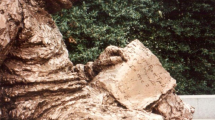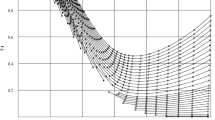Summary
Well known quantum and time paradoxes, and the difficulty to derive the second law of thermodynamics, are proposed to be the result of our historically grown paradigm for energy: it is just there, the capacity to do work, not directly related to change. When the asymmetric nature of energy is considered, as well as the involvement of energy turnover in any change, so that energy can be understood as fundamentally “dynamic”, and time-oriented (new paradigm), these paradoxes and problems dissolve. The most basic consequence concerns the particle-wave dualism. For a reversible inter-conversion of a particle into a wave, subject to a dynamic energy, a self-image of information has to be generated: quantum theory has to be complemented by a theory of information. Then, quantum processes can be derived from classical ones and the second law of thermodynamics with the tendency of increasing entropy follows in a straightforward way.
Similar content being viewed by others
References
Albert D.Z. (2003) Comment Given During the International Conference “On Time”. Einstein Forum, Potsdam, Germany
Aspect A., Grangier P., Roger G. (1982) ‘Experimental Realization of Einstein–Podolsky–Rosen–Bohm-Gedankenexperiment: A New Violation of Bell’s Inequalities’. Physical Review Letters 49: 91
Bell J.S. (1964) ‘On the Einstein Podolsky Rosen Paradox’. Physics 1: 195
Briggs J.S., Rost J.M. (2000) Time Dependence in Quantum Mechanics. EPLD 10: 311
Coveney V. (1988) ‘The Second Law of Thermodynamics: Entropy Irreversibility’. Nature 333: 40
Da Costa N.C.A., Sant’Anna A.S. (2002) Time in Thermodynamics. Foundation of Physics 3: 1785
Davies P.C.W. (1974) The Physics of Time Asymmetry. Surrey University Press, London
Davies P.C.W. (1993) About Time, Einstein’s Unfinished Revolution. Simon and Schuster, Springer, Berlin
Dougherty J.P. (1994). Philosophical Transactions of the Royal Society of London A 346: 259
Enders D., Suisky P. (2005) ‘Über das Auswahlproblem in der klassischen Mechanik und in der. Quantenmechanik, Nova Acta Leopoldina, Quantization as Selection Problem’. International Journal of Theoretical Physics 44(Suppl. 18, 13): 161
Esfeld M. (2004) Quantum Entanglement and a Metaphysics of Relations. Studies in History and Philosophy of Science, Part B 35: 601
Euler, L.: (1911–1986), Opera Omnia, Sub Auspiciis Societatis Scientiarum Naturalium Helvetiae, Ser II, Vols. 3 and 4, Zürich and Basel.
Fraser J.T. (1982) The Genesis and Evolution of Time. University of Massachusetts Press, Amherst MA
Griffin D.R. (1986) Physics and the Ultimate Significance of Time: Bohm, Prigogine, and Process Philosophy. State University of New York Press, New York
Hawking St.W. (1988) A Brief History of Time. Bantam Books New York, New York
Halliwell J.J., Pérez-Mercader J., Zurek W.H. (eds.) (1994) Physical Origins of Time Asymmetry. Cambridge University Press, Cambridge
Ivanovic I.D. (1978) ‘On Complex Bell’s Inequality’. Letters Nuovo Cimento 22: 17
Laloë F. (2001) ‘Do We Really Understand Quantum Mechanics? Strange Correlations, Paradoxes and Theorems’. American Journal of Physics 69: 655
Lindsay, R.P. (ed.): 1975, Energy: Historical Development of the Concept, Benchmark Papers on Energy, Dowden, Hutchingson & Ross Inc., Stroudsburg, Pennsylvania.
Misra, B., Prigogine, I. and Courbage, M.: 1979, Liapounov Variable, Entropy and Measurement in Quantum Mechanics. Proceedings of the National Academy of Sciences of the USA 76, 4768.
Prigogine I. (1997) The End of Certainty, Time, Chaos and the New Laws of Nature. The Free Press, NY
Reichenbach H. (1956) The Direction of Time. University of California Press, Berkeley, CA
Seleri F. (1990) Quantum Paradoxes and Physical Reality. Fundamental Theories in Physical Series. Kluwer Academic Publishers, Dordrecht, MA
Shingyoji C., Higuchi H., Yoshimura M., Katayama E., Yanagida T. (1998) ‘Dynein Arms are Oscillating Force Generators’. Nature 393: 711
Störmer H.L. (1990) The Fractional Quantum Hall Effect. Science 248: 1510
Suisky, P. and Enders, D.: 2003, ‘On the Derivation of the Schrödinger Equation. Quantization as Selection Problem’. Fifth International Conference on Fundamentals of Frontiers in Physics, Hyderabad.
Tributsch H., Pohlmann L. (1993) ‘Cooperative Electron Transfer: Superconduction in Biological Structures?’. Journal of Theoretical Biology 165: 225
Tributsch, H. and Bogomolni, R.A.: 1994, ‘Bacteriorhodopsin: A Molecular Photooscillator?’ Chemistry Physics Letters 227, 74 and discussion by Birge, R.: 1994, Nature, 371, 659.
Tributsch, H.: 2007, Energy Time and Consciousness (to be published).
Wheeler, J.A.: 1979, ‘Frontiers of Time’, in Toraldo d: Francia, G. (ed.): Problems in the Foundation of Physics, Proceedings of the International School of Physics «Enrico Fermi» Course LXXII, Italian Physical Society, Bologna, 395–497.
Wheeler, J.A.: 1994, ‘Time Today’ in Halliwell et al. (eds.), 1–29.
Withrow G.J. (1972) What Is Time? Thames and Hudson, London 1980, The Natural Philosophy of Time. Carendon Press, Oxford
Zeh H.D. (1992) The Physical Basis of the Direction of Time. Springer, Berlin
Zeilinger A. (1999) ‘Experiment and the Foundation of Quantum Physics’. Review of Modern Physics 71: S288
Author information
Authors and Affiliations
Corresponding author
Rights and permissions
About this article
Cite this article
Tributsch, H. Quantum Paradoxes, Time, and Derivation of Thermodynamic Law: Opportunities from Change of Energy Paradigm. J Gen Philos Sci 37, 287–306 (2006). https://doi.org/10.1007/s10838-006-9012-7
Published:
Issue Date:
DOI: https://doi.org/10.1007/s10838-006-9012-7




